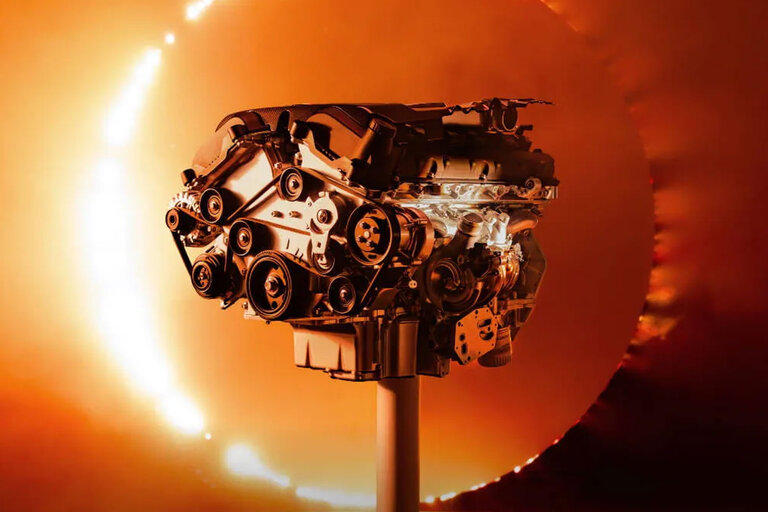
You may have been advised, while having your car serviced, to swap out the air in the tires with nitrogen. This practice has been promoted as a way to keep tires inflated longer, especially in changing temperatures, either by inflating them with nitrogen instead of air or using a combination of the two. This guide can help you decide whether it’s something you want to pursue for your own vehicle.
To cut to the chase, adding nitrogen to your tires is a typical upsell tactic at tire shops. There are some benefits in motorsports, and it sounds good in theory, but for the typical car owner, sticking with normal air is perfectly fine. As long as you keep your tire pressures at the correct spec, you should be good to go.
Check Out: 7 Hot Aftermarket Wheels to Buy
What Are Nitrogen Tires?
Nitrogen tires are filled with nitrogen instead of, or in addition to, regular air. The larger, slower-moving nitrogen molecules seep out of the tire more slowly, and some experts say this can help keep tires inflated longer. Using a combination of nitrogen and air in your tires won’t harm them, but it might reduce the effectiveness of the nitrogen fill and cause your tires to deflate more quickly than if you used pure nitrogen. An accurate pressure gauge can help you maintain proper tire pressure, whether using nitrogen or air.
Filling your tires with nitrogen might provide benefits in these areas:
- Gas Mileage. Properly inflated tires can improve gas mileage, whether they are filled with air or nitrogen. You can use nitrogen in your tires to possibly help your tires stay correctly inflated longer.
- Tire Longevity. Maintaining proper tire pressure can help your tires last longer. You can accomplish this with nitrogen or air, although nitrogen may require fewer top-offs.
- Better Handling. Vehicles handle better when tires are kept at the right capacity. Using nitrogen might help you keep your tires at the proper volume longer.
Types of Nitrogen Tires
Any tire can be filled with nitrogen instead of air. Here are some considerations when using nitrogen in some common tire types:
Summer Tires
Standard summer tires perform well in dry and wet conditions. They often perform best in summer weather or weather that is generally warm and dry. Using nitrogen in your summer tires might help you keep a consistent tire pressure when the temperature changes drastically, such as a cool summer night followed by a very hot day.
Winter (Snow) Tires
Snow tires, or winter tires, use special rubber and tread and sometimes even metal studs to handle wintry conditions such as snow and ice. Nitrogen’s extreme weather benefits may be useful in cold conditions, and you might find that you lose less tire pressure during weather fluctuations than if you were to use nitrogen-free air.
All-Season Tires
All-season tires are a safe bet in areas with relatively moderate conditions, including temperate winters. They offer modest traction and don’t need to be replaced seasonally. Filling your all-season tires with nitrogen might help you retain tire pressure through seasonal temperature shifts, especially when the seasons change.
Performance Tires
Performance tires are often used for high-speed or luxury vehicles. They are often a low-profile, wide tire with shallow treads and increased traction in some conditions. Nitrogen offers the same benefits in performance tires as it does in other tire types, including less frequent top-offs.
Off-Road Tires
Off-road tires are used for vehicles that can handle rough conditions such as rocks, mud, and deep snow. They are usually durable with deep tread. Using nitrogen in your off-road tires might help you control your tire pressure specifically for the conditions you expect out on the terrain.
Things to Think about when Considering Nitrogen for Your Tires
When you are deciding whether to use nitrogen in your tires, keep these factors in mind:
- Budget. Most locations charge to fill your tires with nitrogen. You might also purchase tires that come pre-filled with nitrogen. Research nitrogen tire fill costs in your area and consider the expense before purchasing your tires. Remember that you might not have to refill your tires as often when you use nitrogen compared to air.
- Current Tire Fill. If your tires are currently filled with nitrogen, you might decide to continue filling them with nitrogen only to maintain the maximum benefits. If you decide to top off your tires with regular air, it won’t harm or damage your tires in any way, and it’s perfectly safe to do so. Mixing nitrogen and air might just mean you need to fill your tires more often. You can sometimes tell whether your tires are pre-filled with nitrogen based on the color of the valve-stem cap. A green cap is often used to indicate a nitrogen fill.
- Accessibility. Consider the availability of nitrogen in your area. Ease of access might impact your decision to fill your tires with nitrogen, especially if you prefer to avoid mixing nitrogen and air to preserve the full benefits of nitrogen tires. If you plan to travel, you might consider researching nitrogen dealers in locations you plan to visit, particularly if you need to fill your tires while you are away.
How to Replace/Install Nitrogen in Your Tires
Your local tire dealer can help you fill your tires with nitrogen for the first time. They will usually remove the regular air from your tires and then refill them with nitrogen multiple times. This helps eliminate any remaining oxygen and moisture inside.
To top off or refill your tires with nitrogen, visit a dealer or tire shop near you. Some retailers may only fill tires that were purchased from them and others might require a membership.
If you find that you are in a situation that calls for a top-off or reinflation and you are away from a nitrogen dealer, use whichever source of air you can find. Maintaining proper tire pressure is more important than the composition of the air in the tire. Properly inflated tires handle better, may get better gas mileage, wear more evenly, and can help keep you safer on the road. You can always return to a dealer for a full nitrogen fill when you get to another area.
Where to Buy Products for Nitrogen Tires
Make sure to verify the correct tire size for your vehicle.
This content is created and maintained by a third party, and imported onto this page to help users provide their email addresses. You may be able to find more information about this and similar content at piano.io
#Guide #Nitrogen #Tires
Source link












